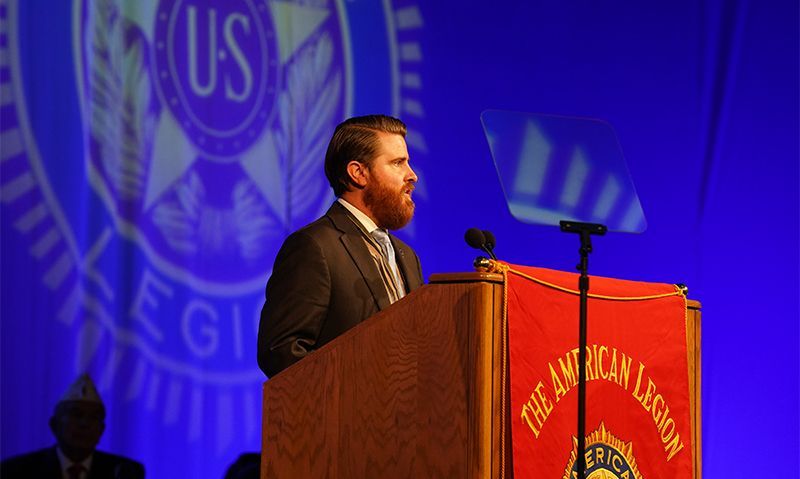
Student Veterans of America (SVA) President and CEO Jared Lyon told thousands of American Legion members Tuesday that they should make connections with their local SVA chapters, especially now, as the war is coming to an end. “We want to continue to serve after we take off the cloth of our nation. The American Legion, in my opinion, is still one of the best places to continue to serve.”
The post-9/11 U.S. Navy veteran who used the GI Bill to earn undergraduate and master’s degrees spoke of the alliance SVA – now with more than 1,500 chapters nationwide – has had with The American Legion over the last 13 years. In 2008, SVA’s first year, American Legion National Headquarters provided free office space in Washington, D.C., for the new organization and formed an alliance to fight for the Post-9/11 GI Bill signed into law the following year.
Since then, SVA and The American Legion have continued to push for improved education benefits for veterans, as recently as their shared success to close the so-called “90-10” loophole last spring that made GI Bill-using student veterans vulnerable to predatory and deceptive marketing from for-profit schools.
The Legion and SVA have long collaborated to keep the GI Bill current and effective, significantly with the signing of the Harry W. Colmery Veterans Educational Assistance Act of 2017 – the “Forever GI Bill” – named for the American Legion past national commander who drafted the original World War II GI Bill. Among the features of the “forever” version in 2017 was a lifting of time restrictions to use the education benefits.
Lyon noted in his remarks at the 102nd American Legion National Convention that the Legion and SVA also have fought together to disprove inaccurate assertions about the academic performance of student veterans. “Nearly three out of four of us end up on college campuses within seven months after we transition out of the military, making colleges some of the most common places you’ll find my generation of veterans and making the GI Bill, quite literally, the front door to the U.S. Department of Veterans Affairs … what it means to be a veteran, with access to the benefits and services that veterans are entitled to.”
And, in terms of grade-point average, completion rates and success after graduation, student veterans consistently outperform students who did not serve, he said. “With the right support, student veterans and military-affiliated students exceed all expectations. Together with the Legion, SVA can continue to bust the myths that veterans are charity cases, that we’re broken or perhaps even not smart enough to go to college or succeed after graduation. In fact, the truth is quite the opposite.”
As U.S. forces come home from war in the Middle East, they also have available to them an under-used opportunity to take advantage of millions in scholarship dollars for educations in science, technology, engineering and math (STEM) disciplines, Lyon explained. “These majors are vital to America’s national security. The Edith Nourse Rogers STEM Scholarship offers $75 million annually to encourage student veterans to not only pursue but complete their STEM degrees. But sadly, presently only 24.5 percent of this scholarship was used last year. Veterans have a high propensity to succeed in STEM majors, but many are discouraged by poor academic advising, and many others will switch to another major before graduation, due to funding and time issues. This should never happen. That’s why we are joining together with our partners on a critical mission to improve the retention and outcomes for student veterans in high-demand fields, such as STEM, while preventing or even in some cases reducing the need for student debt.”
Another shared concern – helping today’s post-9/11 veterans digest the end of the Global War on Terrorism and support them, veteran to veteran, as well as Afghan refugees who assisted U.S. forces in the war. “The past few weeks have been incredibly difficult for me to watch, personally,” Lyon explained. “And it’s impossible during this time not to reflect on my own service and that of our fellow veterans, active-duty servicemembers, also the Guard and Reserve, our military families, our survivors, our caregivers, our allies and supporters, many of whom are sitting right here with us today in this room. If you feel anything like I do, I want you to know that you are not alone. You deserve to be listened to, and we are here to support you.”
To provide such support – and opportunity – Lyon said it’s important for Legionnaires to actively engage them. Noting that he had never been asked to join The American Legion until three years ago, he said a simple overture will likely produce a positive outcome.
“I encourage you to get involved with an SVA chapter that’s closest to your Legion posts back home. Never be afraid to ask a younger veteran to join the Legion.”
- Convention

